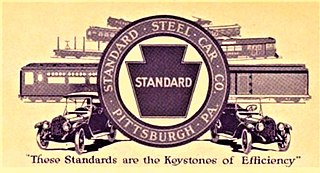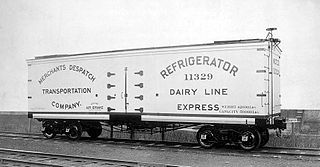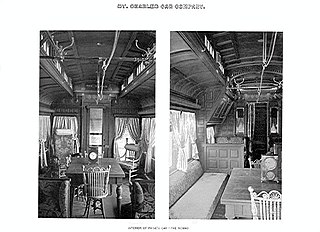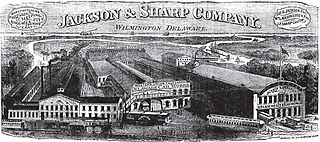Related Research Articles

William Hartman Woodin was a U.S. industrialist. He served as the Secretary of Treasury under Franklin Roosevelt in 1933.

In railroad terminology, a stock car or cattle car is a type of rolling stock used for carrying livestock to market. A traditional stock car resembles a boxcar with louvered instead of solid car sides for the purpose of providing ventilation; stock cars can be single-level for large animals such as cattle or horses, or they can have two or three levels for smaller animals such as sheep, pigs, and poultry. Specialized types of stock cars have been built to haul live fish and shellfish and circus animals such as camels and elephants. Until the 1880s, when the Mather Stock Car Company and others introduced "more humane" stock cars, death rates could be quite high as the animals were hauled over long distances. Improved technology and faster shipping times have greatly reduced deaths.

The Grand Trunk Western Railroad Company was an American subsidiary of the Canadian National Railway operating in Michigan, Illinois, Indiana, and Ohio. Since a corporate restructuring in 1971, the railroad has been under CN's subsidiary holding company, the Grand Trunk Corporation. Grand Trunk Western's routes are part of CN's Michigan Division. Its primary mainline between Chicago and Port Huron, Michigan serves as a connection between railroad interchanges in Chicago and rail lines in eastern Canada and the Northeastern United States. The railroad's extensive trackage in Detroit and across southern Michigan has made it an essential link for the automotive industry as a hauler of parts and automobiles from manufacturing plants.

Canadian Car and Foundry (CC&F), also variously known as "Canadian Car & Foundry" or more familiarly as "Can Car", was a manufacturer of buses, railway rolling stock, forestry equipment, and later aircraft for the Canadian market. CC&F history goes back to 1897, but the main company was established in 1909 from an amalgamation of several companies and later became part of Hawker Siddeley Canada through the purchase by A.V. Roe Canada in 1957. Today the remaining factories are part of Alstom after its acquisition of Bombardier Transportation completed in 2021.

The Standard Steel Car Company (SSC) was a manufacturer of railroad rolling stock in the United States that existed between 1902 and 1934.

The Merchants Despatch Transportation Company was established in 1857 or 1858 by the American Express Company of New York. The entity was reformed as a joint stock trading company on June 1, 1869, with ownership divided among the Cleveland, Columbus, Cincinnati and Indianapolis Railway (CCC&I), the Lake Shore and Michigan Southern Railway, and the New York Central Railroad (NYC), all part of the Cornelius Vanderbilt rail empire.

St. Charles Car Company, a railroad rolling stock manufacturing company located in St. Charles, Missouri, was founded in 1872 or 1873. In 1899 it merged with twelve other companies to form American Car and Foundry (ACF). The St. Charles plant became the main passenger car works. With a failing market for steel passenger cars, ACF phased out the St. Charles operation in 1959.
The Michigan Car Company was a railroad rolling stock manufacturer located in Detroit, Michigan.
The Peninsular Car Company was a railroad rolling stock manufacturer, founded by Charles L. Freer and Frank J. Hecker in 1885.
The Flint and Pere Marquette Railroad (F&PM) is a defunct railroad which operated in the U.S. state of Michigan between 1857 and 1899. It was one of the three companies which merged to become the Pere Marquette Railway.
Buffalo Car Manufacturing Company, also known as Buffalo Car Company or Buffalo Car Works, was an American manufacturer of railroad freight cars in the late 19th century. In 1899, this company was merged with twelve others to form American Car and Foundry Company.
Ensign Manufacturing Company, founded as Ensign Car Works in 1872, was a railroad car manufacturing company based in Huntington, West Virginia. In the 1880s and 1890s Ensign's production of wood freight cars made the company one of the three largest sawmill operators in Cabell County. In 1899, Ensign and twelve other companies were merged to form American Car and Foundry Company.
Jackson & Woodin Manufacturing Company, also called Jackson & Woodin Car Works, was an American railroad freight car manufacturing company of the late 19th century headquartered in Berwick, Pennsylvania. In 1899, Jackson and Woodin was merged with twelve other freight car manufacturing companies to form American Car & Foundry Company. Jackson and Woodin's management were proponents of the temperance movement in America, and went as far as buying all the saloons and hotels in Berwick, leading to Berwick becoming a dry town by 1881. By the time of the 1899 merger that created American Car and Foundry Company (ACF), Jackson & Woodin was the largest freight car manufacturer in the eastern United States. The Jackson & Woodin shops became ACF's Berwick Plant, a plant that was heavily used by ACF.

Jackson and Sharp Company was an American railroad car manufacturer and shipbuilder in the late 19th and early 20th centuries. The company was founded in 1863 by Job H. Jackson, a tinsmith and retail merchant, and Jacob F. Sharp, a carpenter who had worked for rail car manufacturers and shipbuilders.

Lansing Manufacturers Railroad was a beltline switching railroad organized in 1904 to connect Cornelius Vanderbilt's Michigan Central mainline on the north edge of Lansing, Michigan, to automotive factories on the west and south side of the city and to Sir Henry Tyler's Grand Trunk Railroad along the north bank of the Grand River. The company's 5.1-mile (8.2 km), C-shaped right of way lay entirely within the city limits. Important customers included GM's Reatta Craft Centre, Lansing Metal Center, and both plants of Lansing Car Assembly.
Joint Stock Company “Tikhvin Freight Car Building Plant” (TVSZ) is a Russian freight car manufacturer, the largest in the CIS. Launched in January 2012, Tikhvin Freight Car Building Plant is the main production facility of Research and production corporation “United Wagon Company”.
Midland-Ross Co. was an American steel, aerospace products, electronics, and automobile components manufacturer which existed from 1894 to 1986.
References
- 1 2 3 4 "Michigan-Peninsular Car Company". Mid-Continent Railway Museum. 2006-04-11. Retrieved 2008-04-16.
- ↑ Klug, Thomas (November 5, 1999). Railway Cars, Bricks, and Salt: The Industrial History of Southwest Detroit before Auto (PDF) (Speech). Archived from the original (PDF) on July 13, 2007.
- ↑ Moody, John (1904). The Truth about the Trusts: A Description and Analysis of the American Trust. New York: Moody Publishing Company. pp. 217 . Retrieved 2008-04-16.
jackson & woodin.
- ↑ White 1993 , p. 604
- 1 2 "Michigan-Peninsular Car Company". New York Times. 1897-07-28. Retrieved 2008-04-16.
- ↑ White 1993 , p. 150
- White, John H. Jr. (1993). The American Railroad Freight Car: From the Wood-Car Era to the Coming of Steel. Baltimore: Johns Hopkins University Press. ISBN 0-8018-4404-5. OCLC 26130632.